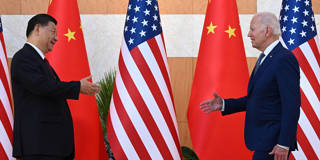The global economy’s dire and deteriorating prospects, together with the scale of the climate challenge, have apparently opened world leaders’ eyes to the risks that deglobalization poses. But it remains to be seen whether this realization will be followed by the action needed to reverse course.
HONG KONG – November was an extraordinary month. Global leaders gathered for four major meetings: the ASEAN meeting in Cambodia, the G20 summit in Indonesia, the Asia-Pacific Economic Cooperation (APEC) forum in Thailand, and the United Nations Climate Change Conference (COP27) in Egypt. What was striking wasn’t the timing of the meetings, but rather the evidence they produced that the tide might be turning away from confrontation toward renewed cooperation in the international arena.
In recent years, the global economy has appeared to be drifting away from multilateral engagement and collaboration, toward nationalism-fueled competition. Some – particularly emerging economies – attempted to resist this trend, such as by refusing to back Western sanctions on Russia. But such efforts appeared to have had minimal impact.
As numerous observers have noted, a complete reversal of globalization would be virtually impossible. According to research by the McKinsey Global Institute, no region, let alone country, is close to being self-sufficient. But that has not stopped some countries and leaders – in particular, the United States – from pursuing it. And even the partial deglobalization they have brought about would have far-reaching consequences, some of which – such as increased inflation and heightened debt risk – are already becoming apparent.

HONG KONG – November was an extraordinary month. Global leaders gathered for four major meetings: the ASEAN meeting in Cambodia, the G20 summit in Indonesia, the Asia-Pacific Economic Cooperation (APEC) forum in Thailand, and the United Nations Climate Change Conference (COP27) in Egypt. What was striking wasn’t the timing of the meetings, but rather the evidence they produced that the tide might be turning away from confrontation toward renewed cooperation in the international arena.
In recent years, the global economy has appeared to be drifting away from multilateral engagement and collaboration, toward nationalism-fueled competition. Some – particularly emerging economies – attempted to resist this trend, such as by refusing to back Western sanctions on Russia. But such efforts appeared to have had minimal impact.
As numerous observers have noted, a complete reversal of globalization would be virtually impossible. According to research by the McKinsey Global Institute, no region, let alone country, is close to being self-sufficient. But that has not stopped some countries and leaders – in particular, the United States – from pursuing it. And even the partial deglobalization they have brought about would have far-reaching consequences, some of which – such as increased inflation and heightened debt risk – are already becoming apparent.